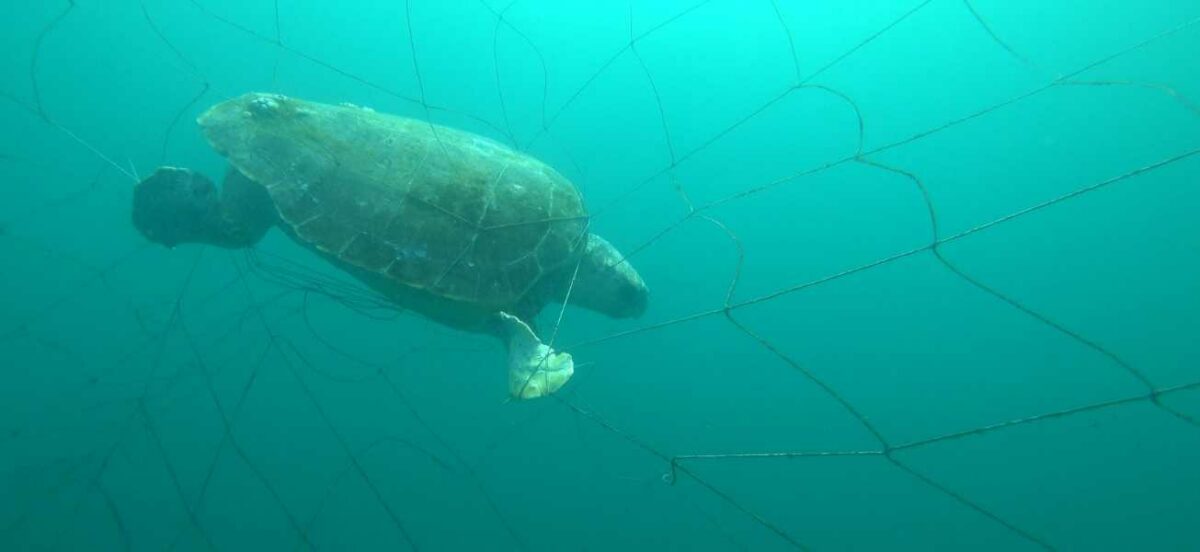Earlier this week another whale was entangled in Queensland’s deadly shark nets. This is the third whale in one month to struggle for their life.
Between 2001 to 2017, Queensland’s shark nets and lethal drumlines have caught a staggering 13,189 marine animals, including turtles, dolphins, dugongs and rays.
A 2017 Senate Inquiry found it was impossible for the shark nets to guarantee swimmer safety. Yet they have cost thousands of innocent marine animals their lives. Action for Dolphins stand with many others in firmly believing these nets must be taken out.
Mark Furner is the minister in charge of Queensland’s Shark Control Program. We wrote him an open letter urging him to remove the nets and animal protection organisations, conservation organisations, local stakeholders, and scientific experts signed on.
It’s time the Queensland Government listened. Check out our letter below.
To the Hon. Mark Furner,
Re: Queenland’s lethal shark control program
On behalf of the undersigned animal protection organisations, conservation organisations, local stakeholders and scientific experts, we are writing to express our concerns in relation to the Queensland Department of Agriculture and Fisheries lethal shark control program.
The 2017 Australian Senate Inquiry report reviewed evidence for and against the effectiveness of mesh nets and lethal drum lines and found that it is impossible for them to guarantee public safety.
High-levels of by-catch mean that Queensland’s current shark control program causes significant damage to the marine environment.
According to QLD Government’s catch statistics, between 2001 to 2017 the mesh nets and lethal drum lines caught 13,189 marine animals, a figure which includes animals from both endangered and critically endangered species. In this 16-year period alone, 706 turtles, 284 dolphins, 59 whales, 32 critically endangered grey nurse sharks and 16 dugongs have been caught.
According to a recent study published in Communications Biology some species of sharks have declined by up to 92% off Queensland’s coast causing them to be more vulnerable to exploitation.
While we welcome the government’s recent announcement to invest $1 million annually over the next four years into researching new technologies, we request that the additional $13.1 million not be directed to maintaining or increasing the current lethal shark control program.
Scientific research into more effective shark bite mitigation and trialling of these technologies has already been underway in Australia for a number of years. In line with the recommendations of the Australian Senate, we believe these funds would be better directed towards investment in non-lethal alternatives such as, drones, shark spotting, barriers and personal protection devices.
Yours sincerely,
- Action for Dolphins
- Elasmo
- Gen Blue
- Greenpeace Australia Pacific
- Humpbacks and Highrises
- Migaloo 2 Foundation
- PETA Australia
- Sea Shepherd
- Sentient
- Shark Conservation Australia
- Sunshine Coast Environment Council
- Whale and Dolphin Conservation
- World Animal Protection
- Voiceless, The Animal Protection Institute
- Dr Leah Gibbs, School of Geography and Sustainable Communities, Faculty of Social Sciences, University of Wollongong
- Dr David Powter, Conjoint Senior Lecturer, Environmental Science Coordinator, English Language and Foundation Studies Centre, The University of Newcastle
- Associate Professor Jane Williamson, Head Marine Ecology Group, Deputy Director, Maquarie University Marine Research Centre, Department of Biological Sciences, Maquarie University
- Professor Jessica Meewig, Director – Marine Futures Lab, University of Western Australia
- Dr Simon J Pierce, PhD, Co-Founder and Principal Scientist, Marine Megafauna Foundation, Vice Co-chair (Sub-Equatorial Africa), IUCN Shark Specialist Group, Science Advisor, Wildbook for Whale Sharks
- Dr Neil Hammerschlag, PhD Research Associate Professor, Rosenstiel School of Marine and Atmospheric Science, Abess Centre for Ecosystem Science and Policy, Director Shark Research and Conservation Program, University of Miami
- Dr Mikki McComb-Kobza, Executive Director, Ocean First Institute
- George H. Burgess, Director Emeritus – Florida Program for Shark Research, Curator Emeritus – International Shark Attack File, International Sawfish
- Encounter Database, University of Florida
- Dr Robert E. Heuter, PhD, Director, Centre for Shark Research, Mote Marine Laboratory
- Dr. Chris Pepin-Neff, Senior Lecturer in Public Policy, The University of Sydney
